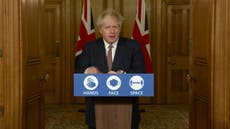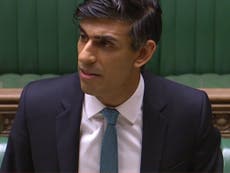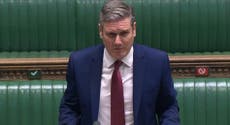Harsh benefit cuts to blame for rising poverty, former Conservative Cabinet minister admits
‘We took too much money out of Universal Credit, we squeezed too hard’ says Stephen Crabb - urging Rishi Sunak not to repeat the blunder
Your support helps us to tell the story
From reproductive rights to climate change to Big Tech, The Independent is on the ground when the story is developing. Whether it's investigating the financials of Elon Musk's pro-Trump PAC or producing our latest documentary, 'The A Word', which shines a light on the American women fighting for reproductive rights, we know how important it is to parse out the facts from the messaging.
At such a critical moment in US history, we need reporters on the ground. Your donation allows us to keep sending journalists to speak to both sides of the story.
The Independent is trusted by Americans across the entire political spectrum. And unlike many other quality news outlets, we choose not to lock Americans out of our reporting and analysis with paywalls. We believe quality journalism should be available to everyone, paid for by those who can afford it.
Your support makes all the difference.Harsh benefit cuts are to blame for rising poverty in Britain, a former Conservative Cabinet minister has admitted – as he pleaded with Rishi Sunak not to repeat the mistake.
In remarkably candid comments, Stephen Crabb said the steep reductions in Universal Credit – begun by George Osborne five years ago – had failed to raise wages, as the former Chancellor hoped.
“Five years on, looking back, I would say we took too much money out of Universal Credit. We squeezed too hard,” said Mr Crabb, a former Work and Pensions Secretary.
And he admitted: “That's what gives you a lot of the reasons behind the increase in hardship in this country.”
The backbencher spoke out amid rising criticism of the current Chancellor for planning to slash £20-a-week from Universal Credit payments next April.
The football star Marcus Rashford, who forced a climbdown on free school meals, has now thrown his weight behind the campaign to retain the increase put through at the start of the pandemic.
But Mr Crabb warned some ministers saw restoring the cut as a way to start plugging the £40bn black hole in the public finances, without there being “a political price to pay”.
He criticised a “missed opportunity” to help poorer families, when the bleak economic outlook for 2021 was already crystal clear.
“There will certainly be more people unemployed, there'll be more families relying on Universal Credit and more people relying on it for greater periods,” he told BBC Radio 4.
“And the thing about Universal Credit is that the longer you are on it, the harder it is to make ends meet.”
Six million households face the £1,000-a-year cut to their incomes, if Universal Credit is reduced again – just as unemployment is expected to soar to 2.6 million, Mr Sunak has acknowledged.
In a further criticism of the government’s anti-poverty record, campaigners have attacked a near-doubling of the number of households hit by the overall cap on benefits.
There were 168,400 households subject to the cap in August 2020 - up from around 77,913 households in February, before the coronavirus pandemic hit.
The limit is set at £20,000 a year for families outside London, and £23,000 for those in the capital – with ministers rejecting pleas for it to be relaxed while the Covid-19 crisis continues.
There are 600,000 more children living in relative poverty since the Conservatives came to power in 2010, official figures show.
That total grew by 100,000 last year alone, leaving 4.2 million youngsters in the UK – or 30 per cent – existing below the poverty line.
Mr Crabb said the Treasury, under Mr Osborne’s leadership, “hated Universal Credit” until it realised it was a mechanism to slash benefits, in comparison with the existing tax credits system.
It only “got behind it” when it “spotted an opportunity for rolling out a cut to the welfare budget”.
Subscribe to Independent Premium to bookmark this article
Want to bookmark your favourite articles and stories to read or reference later? Start your Independent Premium subscription today.






Join our commenting forum
Join thought-provoking conversations, follow other Independent readers and see their replies
Comments